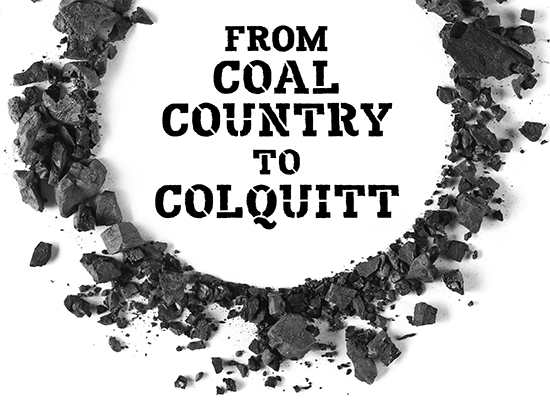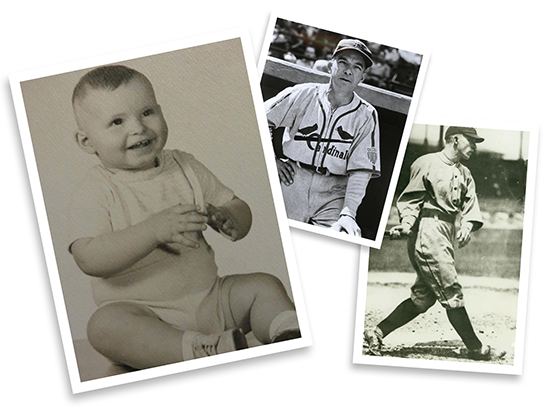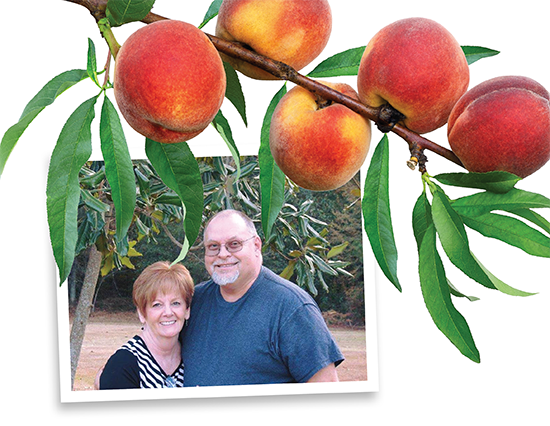
August-
September 2023
Changing World...
Unchanging Mission
------------------
|





From Coal Country to Colquitt
By Eric K. Thomsen
“We call these ‘cathead’ biscuits. Not sure how they got their name.”
A broad smile spreads across William Smith’s face as he deftly flips the flaky biscuits from the black-iron skillet onto a waiting plate. My mouth waters as the sweet, buttery aroma blends with the smell of the sausage gravy simmering on the stove.
William sighs deeply. “Mmmmm. Smell that? Doesn’t get much better!”
You don’t have to spend much time with William and his wife Terra in their gracious southern home near Colquitt, Georgia, to discover he is passionate about cooking...and eating. Tossing a kitchen towel over his shoulder, he turns back to the stove and begins frying eggs—yard eggs, mind you. Not those store-bought ones with anemic yolks and no flavor. These are straight from the coop.
In that moment, I feel as though I have been transported into the pages of Southern Living magazine. I lean back in my chair, savor the aromas, sip strong coffee, and listen to William’s endless stories about the place and people he has come to love.
Coal Country
These days, you would never guess William is not a native South Georgian. But, he was born into a West Virginia coal mining family. His dad operated a coal preparation plant, where coal was washed for refinement. A WWII veteran, William’s dad was featured in Ernie Pyle’s Here Is Your War. Pyle described how, after recovering from a gunshot wound suffered in Sicily, William’s dad served with the force that freed Jewish prisoners from concentration camps.
Though William’s mother was a faithful Christian, William’s dad did not come to know Christ until later in life. Over the years, a bi-vocational preacher named Billy Smith (brother of Free Will Baptist missionary Alice Smith) set a good Christian example for William’s dad as the foreman at the coal plant. William thanks the Lord for Billy’s example: “He didn’t cuss or swap dirty stories. It wasn’t Billy’s preaching that was the reason my daddy got saved. It was what happened at the plant!”
William fondly recalls childhood days in his West Virginia home. Bass fishing with his dad in the summers. The smell of sassafras trees and the strong tea it produced. Making apple butter in the fall with Grandpa Johnson—outside, in a cast iron black cauldron, throwing copper pennies in the bottom and stirring the mixture with a wooden paddle over an open fire.
“I remember the crisp air, picking the apples, the smell of the sauce and butter simmering in that cauldron,” William recalls. “My grandmother always made one batch with red hots rather than cinnamon, just for us grand-boys. That batch was bright red, not the usual brown, and it had a special place in her cupboard. Only us boys were allowed to eat it.”
William points to these good early years and the part they played in the man he is today. “I didn’t hear my dad say ‘I love you’ often, but I knew. It wasn’t what we had; we were dirt poor. It was in his actions: taking me fishing, spending time with me, providing for me, and simply being there.”
“I had a home where my parents loved me, my mother prayed for me, and my daddy had a strong work ethic. In fact, all the men in my life growing up had a strong work ethic. We don’t realize how important our actions are when it comes to impressing our example and our faith on our children.”
Every night, William’s dad read aloud to his children. “And before I could even talk, I also heard my grandpa read entire Louis L’amour books,” he recalls before adding: “Of course, I really didn’t care who wrote the books. I just cared about who read them to me.”

At age six, William began playing baseball. Baseball ran deep in his blood. His great uncle, Billy Southworth, now enshrined in the MLB Hall of Fame, was both a Major Leaguer and later the manager of the St. Louis Cardinals. Billy won three World Series, the first in 1926 as a player against Babe Ruth’s Yankees, and then as the manager of the Cardinals in 1942 and 1944. Following the family passion, William’s pursuit of baseball consumed his youth and high school years. He became a star player, with aspirations of a college and professional career. Then, God threw William a curve.
The Free Will Baptist church in his hometown needed someone to play a minor part in the Christmas play, so they offered William the role. It was their way of pulling the young ballplayer into church. William recalls, “I didn’t go to the church because of the Christmas program; I went because of Paula Roberts. I wanted to meet Paula, but I met the Lord!”
Even more ironic, William played the part of a preacher in the program, and nearly every line he delivered was about the Lord. William stuck around after the play was over and soon began attending church regularly. November 2, 1972, during a revival service, William accepted the Lord at age 16. He was baptized a month later in December, in an unheated church baptistry.
Even before he was saved, William felt God calling him to preach. He admits putting off the decision to accept Christ because he knew, deep down, God wanted him in the ministry. A shy, introverted child, the idea of speaking in public terrified William, and he fought the Lord.
After being saved, he answered the call to preach only two months later, was licensed in April 1973, and was ordained a year later, April 21, 1974. Answering the call to preach only seems right. Turns out, every American generation of William’s family on his mother’s side had at least one preacher, and his dad’s oldest brother was a preacher as well.
After high school graduation, William worked two years for the coal mining company and kept preaching on weekends. West Virginia pastor Burt Hall invited William to preach at the Loudondale Church in West Virginia. Terra Mooney was a member of the youth choir at Loudondale, and it was love at first sight...for William. Not as much for Terra. Her dad liked William more than she did. She had no desire to marry a preacher. “He slowly grew on me,” Terra recalls with a laugh, “and I finally came around.”
The romance soon took the young couple to the altar. As a foodie, William jokes his fondest memory of their wedding day was “the cake!” But then he grows serious and recalls his first glimpse of Terra at the back of the church, wearing her sisters’ wedding dress. She was the third sister to be married in the dress. “Buddy, she shore was something!” William says, with his typical Georgian drawl.
Colquitt
Though a West Virginia politician offered William an appointment to the U.S. Naval Academy, where he could also study theology at nearby Georgetown University, William chose instead to attend Salem Bible College, a small Free Will Baptist school in Florida.
After graduating, William accepted an interim pastorate at Belleview Church, just across the state line in Colquitt, Georgia. When Belleview hired a preacher and William’s interim pastorate ended, Mother’s Home Church (also in Colquitt) offered William its pulpit. This was the beginning of a fruitful pastoral ministry that took William to Quincy, Florida; Charleston, West Virginia; Sophia, West Virginia (where he also served as principal of a Christian school); then back to Blakely, in southwestern Georgia, to the region where William and Terra established their permanent home.

William took an active leadership role among Georgia Free Will Baptists, serving as state camp director, state camp cook, Board of Trustees member, member of the Executive Board, and finally, in 1997, executive secretary-treasurer. For the next quarter century, William guided Georgia Free Will Baptists. He encouraged pastors; promoted state and denominational efforts; planned and hosted state meetings, retreats, and other events; established a state office in Colquitt; and led Georgia to a sound financial position.
Convention
William was the Georgia representative to the General Board of the National Association of Free Will Baptists when then-moderator Carl Cheshier stepped aside in 2002 (though Cheshier stayed another year at the request of recently-elected Executive Secretary Keith Burden). After Tim York was nominated as the next moderator, William was flabbergasted when Nathan Ruble and Jack Richey approached him about his interest in serving as assistant moderator. William shakes his head as he recalls, “I asked them if they had lost their ever-lovin’ minds!” But when they pushed William for an answer, he agreed to accept the nomination, was elected the following year, and served until the 2023 National Convention in Raleigh.
“Those men believed in me, even when I didn’t believe in myself,” William acknowledges. “Jack Williams also was a great supporter and encourager. I am so grateful to him, along with Melvin Worthington, Oakie Tolliver, and Malcolm Freeman. They all made such an impact on my life.”
William explains the assistant moderator plays a crucial, though largely behind-the-scenes, role. In addition to “‘assisting’ the moderator, whatever that means,” he keeps up with discussion time from the business floor and tracks who has spoken from the floor, since delegates cannot speak more than twice. The assistant moderator is the parliamentarian, making sure business stays within Robert’s Rules of Order (though the rules can flex according to the will of the body). William also kept his own detailed notes of all business conducted, apart from those recorded by the clerk and assistant clerk. “It just gave us one more record of the proceedings, just in case something fell through the cracks.”
William laughs when he recalls how unprepared he was for his first convention. “I thought I was ready! I talked with attorneys, took courses on Robert’s Rules, and did everything I could to be prepared. I quickly realized I still faced a steep learning curve. The only way to learn a position like that is to serve in the position.”
Over his 20 years of service, William had opportunity to learn the position well. He enjoyed serving with Executive Secretary Keith Burden, whom he describes as “a strong leader with even stronger morals, values, and integrity.” He also appreciated the approach taken by his fellow moderator. “Tim York has been generous with the body, letting everyone have their say and weigh in on important decisions.”
It could be argued that William, as assistant moderator, had “the best seat in the house” to every aspect of convention business. He recalls several memorable moments. “The year I started, auditor Terry Hill stood up and announced, ‘We are insolvent.’ I thought to myself, ‘What in the world have I gotten myself into?’ Thankfully, we had a leader [Keith Burden] and a board willing to step up to the plate and do what was right and necessary to bring the Executive Office and denomination back into financial health.”
He points to ONE Magazine as the most important decision made during his time in office, “without a doubt! Every faction within our denomination went to the microphone to tell us what a great idea the magazine was. And it continues to prove it was a good decision.”
William also recalls the lengthy debate in Charleston, West Virginia, over the funding structure of international missions. “I was so proud of the way our delegates handled that business. Speaker after speaker after speaker came to the mic to address the issue. Each one was passionate, but things didn’t get out of control. We reached a consensus without losing our senses.”
He remembers hearing Rick Locklear speak when he knew he was dying—the power of his words as he spoke. William fondly recalls “going home” to the convention in Charleston, West Virginia, and having the opportunity to preach.
“There are so many good moments to remember,” he concludes. “But I still say we do too much at the convention. We need more time for fellowship, to sit down together over a cup of coffee or a meal to get to know one another, encourage one another, and talk about the challenges and blessings of ministry. Yes, there is strength in diversity, but we also need to learn how much alike we are as a denomination—how much we agree on.”
As William steps down from his time as assistant moderator, he offers two succinct pieces of advice to whoever follows him and other rising Free Will Baptist leaders. “First, you are there to serve. In God’s pyramid, the higher you rise in leadership, the more you serve. (And never forget we serve at the will of the body.) Second, leave your own agenda at home. That’s not your job.”
The Next Big Adventure
William is turning the corner on this phase of life. He announced his resignation as Georgia executive secretary earlier this year and just wrapped up his time as convention moderator. But he also wants to be clear. God is not done with him yet. In fact, his next big adventure has begun already. Last year, William returned to the pastorate at Cedar Springs FWB Church in Blakely, Georgia, where he pastored decades ago. He quips: “I planned to go pastor a little country church, but it has grown, and it is not so little anymore.”
Nor is William done with state and denominational work. He has already accepted a nomination to a denominational board, and he wants to continue to promote and grow the endowments the state of Georgia has set up. “More than anything else,” he concludes, “I want to spend my time encouraging young, struggling, and hurting preachers.”
What one thing would William say to every Free Will Baptist? “Thank you! I have been so blessed by Free Will Baptists. My wife. My living. My friends. Everything I have, both spiritually and materially, I owe this denomination. And I am so grateful.”
About the Writer: Eric K. Thomsen is managing editor of ONE Magazine. He and his family affectionately refer to William Smith as “Uncle Big Daddy,” as William introduced himself when his daughter was in elementary school. Contact eric@nafwb.org. |
|

